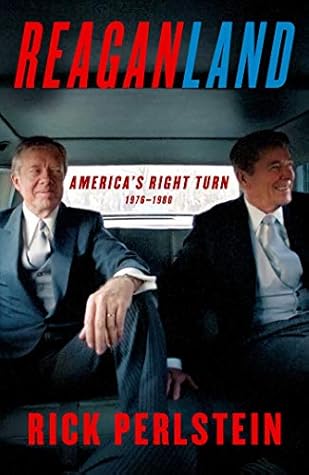More on this book
Community
Kindle Notes & Highlights
Read between
September 20 - October 5, 2021
THE TERM “NEW RIGHT” WAS coined in 1974 by the writer and former Nixon Justice Department official Kevin Phillips. One of the figures he was describing, a man named Paul Weyrich, was once asked to explain what made the New Right new. He answered that they weren’t really conservatives. They were “radicals working to overturn the present power structure in this country.”
That notion—conservatism as an ideology for working people—was another New Right theme.
For the left, employers were the exploiters. The New Right replied that the true exploiters were federal bureaucrats grasping for tax dollars, and the media elites who shoved 1960s libertinism down Middle America’s throats. New Rightists were obsessed with what were known as the “social issues”—crime, government intrusion into family life, sexual mores, the right to own a gun. Reagan’s establishmentarian presidential campaign manager John Sears dismissed them as the “emotional issues.” But the New Right reveled in emotion—particularly the emotion of resentment.
Jimmy Carter’s pollster Pat Caddell understood how dangerous all this could prove to the Democratic coalition: blue-collar voters were vulnerable to conservative appeals because they were “no longer solely motivated by economic concerns—which have traditionally made them Democrats.” Now that they feared “change in society” more than losing their place in the middle class, they were “one of the most vulnerable groups in the Democratic coalition.”
How the hell do we undo this fear of change. Its a fucking nightmare and how the GOP continues to win even though they refuse to address real issuss.
He sounded like V. I. Lenin in 1913. No coincidence: studying radical organizers was one of his only hobbies.
The only one not from Georgia, Midge Costanza, was the former vice mayor of Rochester, New York, a salty feminist whose only evident qualification for a West Wing office next to the president’s was supporting Jimmy Carter before anyone else.
The next week in Miami, many of the same activists who had circulated the anti-gay-rights petitions convinced the Dade County School Board to cancel a desegregation plan. “We don’t want to lose control of our children,” one activist explained, “and that is what happens when they are bused.”
In the tradition of Dixie reaction Allen upheld, nothing was worse than majority rule.
Another aspect of the ordeal was built into American public policy. Whereas other industrialized nations built robust state institutions to protect citizens in times of economic stress, in laissez-faire America the task of care was mostly allotted to individual families—which is to say, wives and mothers.
Hatch had been drilled in the dark arts of minoritarian legislative sabotage by Senator James Allen of Alabama—who
Wanna make a bet on who mentored fucking Mitch McConnell? Because I’d bet a lot of money it was the Hatch asshole. Though I’d also argue that the student has kicked the teacher’s ass at it.
spurring an economic boom whose benefits would be broadly shared, he pointed out, contained a fatal flaw. The precedent it relied on, the Kennedy-Johnson tax cut, had been accompanied by “ ‘Great Society’ programs that vastly increased transfer payments”—and redistributed income downward.
And yet we’re still playing the same old song today as if we say it enough, maybe it’ll magically come true. I fucking hate human nature.
He mentioned his latest object of intellectual excitation, a curmudgeonly history professor from Rochester also quoted in the “Disastermania” article named Christopher Lasch, who was on the cusp of an odd bout with national celebrity himself, thanks to a dense, abstract treatise whose original title was Life Without a Future that had somehow become a national best seller.
The manager for Stone’s cutthroat YR campaign, Paul Manafort, ran the South. Before spring was out, Stone, Manafort, and John Sears’s fired aide-de-camp Charlie Black had formed their own PR firm, hoping to capitalize on their closeness to Reagan should he capture the White House.
This decision will set the course of your life and of our nation’s life not just for the next four years but for many generations to come. It will help to decide what kind of world we live in. It will help to decide whether we have war or peace. It’s an awesome choice.”


